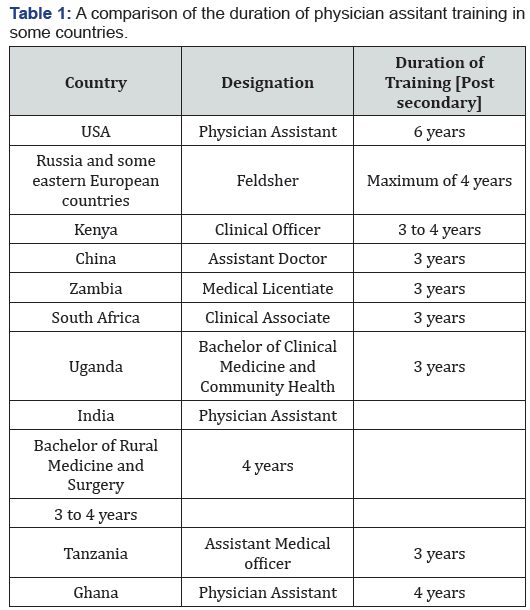Returning the Physician Assistant Profession to its Roots Could Ease the Tension; Reduce Animosity between Physician Assistants and Others. Meanwhile, a Third World Country Needs Physician Assistants
Mister Seun Ayoade*
University of Ibadan, Nigeria
Submission: September 05, 2017; Published: September 12, 2017
*Corresponding author: Mister Seun Ayoade, University of Ibadan, Nigeria, Email: seunoodua@yahoo.co
How to cite this article: Mister S A. Returning the Physician Assistant Profession to its Roots Could Ease the Tension; Reduce Animosity between Physician Assistants and Others. Meanwhile, a Third World Country Needs Physician Assistants. JOJ Nurse Health Care. 2017; 4(1): 555630. DOI: 10.19080/JOJNHC.2017.04.555630
Opinion
Going through any Physician Assistant forum on the internet, one often hears many [not all] American PAs [Physician Assistants] complaining about being underappreciated and mistreated by doctors and patients alike. They generally bemoan their lot; and some are now calling for the profession's name to be changed from Physician Assistant to Physician Associate [like it is called in the UK]. It appears that 70% of American PAs believe they have received a rather raw deal [1-3].
Personally I think the cause of this problem lies in the lengthy duration of PA training in America. In the USA today it takes 6 years of post secondary education to become a PA. In other countries [except for Canada, Australia and the UK] the equivalent of PAs are trained for at most 4 years [post secondary]. I can understand why after 6 years of training a PA would like to receive the respect of someone that trained just 2 years extra. I can perfectly understand why a PA who trained for 6 years wouldn't like to take orders from a doctor from a commonwealth country or the UK where it takes 6 years to become a doctor.
Sometimes the solution to a problem lies in going back to its roots. When the PA program was started in the US in 1965 the training took only 2 years and the graduates were issued a simple certificate, not even a degree. Today, most PAs get Masters Degrees [4].
Those first generation PA students (there were just four of them, three of whom graduated) were former US Army/Navy medics/corpsmen and already had paramedic level training. This previous training had taken them a maximum of 2 years. Today paramedics and US Army and Navy corpsmen/medics still qualify within 6 months to 2 years. However for PAs the training time has more than doubled. I think this is the reason for the bad blood between PAs and doctors in the USA. It appears PAs feel the respect/pay they currently receive is not commensurate to the years they spent in training- and who can blame them? If PA training took a maximum of 4 years [post high school diploma] there would be far fewer angry PAs on the internet bemoaning their lot. In countries where PA training is many years shorter than doctor training there are far fewer doctor/PA clashes. It shouldn't take more than 4 years to become a PA. As a neutral outsider and non American this is my sincere and humble view (Table 1).

Meanwhile Nigeria, a less developed country urgently needs physician assistants. Decades ago, the PA profession was introduced to Ghana, a country of 28 million. Yet Nigeria, a nation of 180 million people and a serious shortage of medical supplies, infrastructure and personnel does not have the physician assistant profession! I strongly urge for its creation [5-8].
In a letter dated September 24, 1964, Eugene Stead, Duke University chair of medicine department stated the following about developing the PA program: "The Department of Medicine of Duke University Medical Center is establishing a program to create a new position in the health field. We have chosen to call these individuals 'physician-assistant.' We believe there is a need for males to be committed to the health field to fill a gap between the physician and the nurse. This gap cannot be filled by additional training for nurses because nurses are already in very short supply.
"These individuals will become skilled in many areas of the medical profession, such as general patient care, intravenous therapy, cardiac resuscitation, respiratory care, catheterization of the bladder, lumbar puncture, paracentesis, gastric and intestinal intubation to name just a few. They will be capable of extending the arms and brains of the physician, so that he can care for more people. They will work under physician supervision in the home, the clinic, the hospital, and in specialized medical care units." Can anyone honestly argue it takes six years to teach the above? The Physician Assistant profession has strayed wildly from the dream of its founding fathers [9,10].
References
- Mittman D (2011) A physician assistant writes to the doctors of America. Social Media's Leading Physician Voice.
- Philo (2014) Do Not Become a PA. PA Forum.
- http://paprogram.yale.edu/profession/history_profession.aspx
- Adjase ET (2014) The physician assistant profession in Ghana. Transformative Education for Health Professionals.
- Adjase ET (2015) Physician assistants in Ghan. Journal of the American Academy of PAs 28(4): 15.
- Martin A (2016) Duke physician assistant program: The birthplace of the physician assistant profession. Duke Community and Family Medicine.
- Kossoy E, Ohry A (1992) The Feldsher: Medical, Sociological and historical aspects of practitioners of medicine with below university level education. Magnes Press, The Hebrew University, Israel.
- Floyd K, Hutubessy R, Samyshkin Y, Korobitsyn A, Fedorin I, et al. (2006) Health-systems efficiency in the Russian Federation: tuberculosis Control. Bulletin of the World Health Organization 84(1): 1-80.
- Wilson A, Lissauer D, Thanqaratinam S, Khan KS, MacArthur C, et al. (2011) A comparison of clinical officers with medical doctors on outcomes of caesarean section in the developing world: meta-analysis of controlled studies. BMJ. Doi: 10.1136/bmj.d2600.
- Ferrinho P, Siziya S, Goma F, Dussault G (2011) The human resource for health situation in Zambia: deficit and maldistribution. Human Resources for Health.






























